May 16, 2025 | 10:12 GMT +7
May 16, 2025 | 10:12 GMT +7
Hotline: 0913.378.918
May 16, 2025 | 10:12 GMT +7
Hotline: 0913.378.918
According to Binh Dinh Department of Agriculture and Rural Development, the province currently has an area of nearly 127,000 hectares of planted forests, and other 40,000 ha of newly planted trees that have not yet become forests, mainly acacia trees.
Every year, organisations and individuals in the province exploit and plant more than 10,000 ha of acacia. Acacia trees play an important role in the forest economy of the province, especially when acacia is considered the "savior" of raw wood in Binh Dinh's timber export.

Forest growers have a great disadvantage due to low productivity and low value when growing small-sized acacia. Photo: V.D.T.
However, in recent years, acacia trees in Binh Dinh have not brought into full play their potential. Most of acacia growing households in the province harvest young tree to sell to woodchip processors for export at low value, because they do not have the financial capacity to raise large timber forests. If the trees are kept longer, large-sized acacia timber will have much higher value.
Nguyen Dinh Lam, Head of Forest Management - Protection and Development Department in Binh Dinh Forest Protection Department said that if 5-year-old acacia forest generated a revenue of only about VND 120 million per ha. Meanwhile, older acacia trees can be sold to wood processing enterprises for export as raw wood, the revenue will increase to VND250 million/ha.
Lam said that the vast majority of acacia growers now only harvested acacia at the age of 5 - 6, even at the age of 4. If the forest is raised for another 5 years to become a large timber forest, it did not cost the planters much because, in the five following years, acacia trees eat less nutrients but grow very fast, the wood quality is better, the wood density is higher.
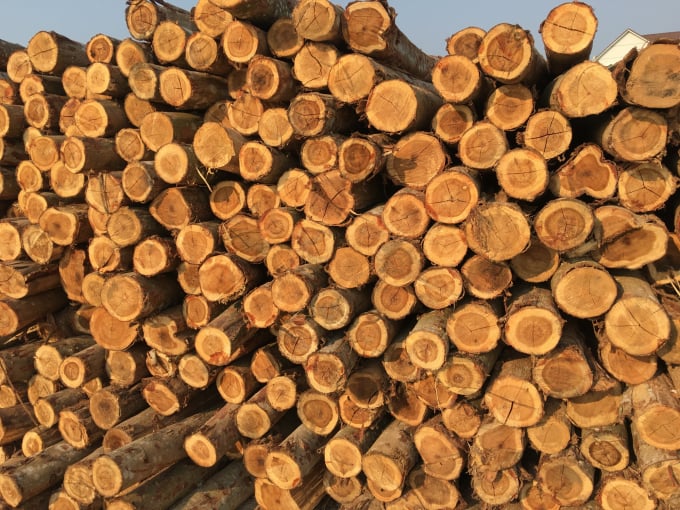
Acacia wood of all sizes can be used as raw materials to make furniture for export. Photo: V.D.T.
"If young acacia wood is harvested, each block has a density of only 0.7 tonne while if harvesting large trees, the density of wood will increase with one block reaching one tonne. Wood processing enterprises pay higher prices for large-sized acacia timber. Thus, forest growers get double benefits," said Nguyen Dinh Lam.
Tran Van Phuc, Director of Binh Dinh Department of Agriculture and Rural Development, said that to improve economic efficiency from planted forests, since 2018, the provincial People's Committee has issued Decision No. 2440/QD-UBND, approving the scheme developing large timber trees in the province in the 2016-2020 period, with a vision that by 2035. Accordingly, Binh Dinh will have 30,000 hectares of large timber forests granted a certificate of sustainable forest management (FSC).
Since then, its forestry sector has aimed to develop and use forests sustainably and effectively, in order to basically meet the needs of forest products for domestic consumers and for export, especially ensure social stability in ethnic minority areas and biodiversity conservation and environmental service provision.
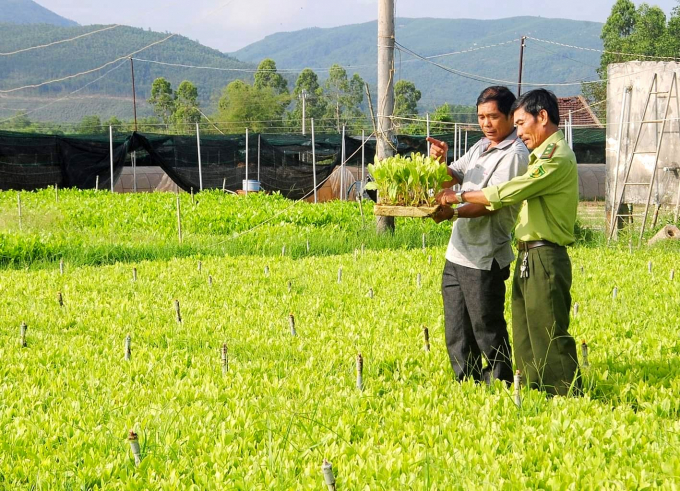
Binh Dinh authorities check acacia seedlings before the planting season. Photo: V.D.T.
To implement the project of developing large timber forests for production in the value chain from afforestation, processing, consumption and forestry development in a sustainable way, Binh Dinh chose State-own forestry companies to implement models.
Quy Nhon Forestry Co., Ltd. is a pioneer in investing in large-scale timber plantations in a closed chain from selection and incubation, technology investment and funding to improve the capacity of sustainable forest management, meeting international standards.
In addition, Ha Thanh Forestry Company Limited and Song Kon Forestry Company Limited are alsp participating in large timber plantations, progressing to FSC certification. Profits from forests FSC-certified plantations are VND20 to 30 million per ha higher than uncertified forests, said Phuc.
Tran Nguyen Tu, Director of Quy Nhon Forestry Company Limited, at the end of 2020, the company was officially granted FSC forest certificate by GFA (Federal Republic of Germany) for 4,183.6 ha/8445, 44 ha of forest and forest land that the company is managing.
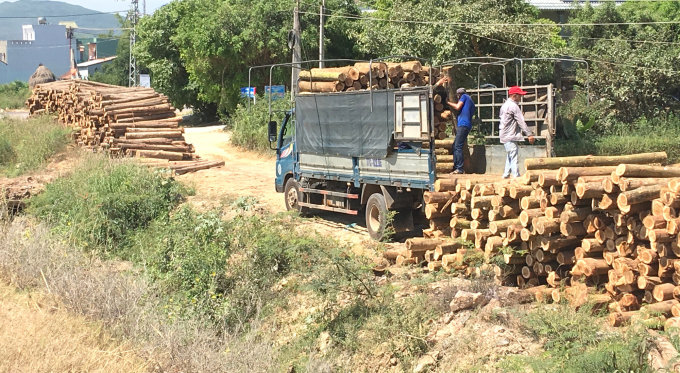
Large-sized acacia wood is purchased by furniture processing enterprises as raw materials. Photo: V.D.T.
“Receiving the FSC certificate helps Quy Nhon Forestry Co., Ltd.'s forest products to have high economic value when being consumed in domestic and foreign markets. This is the foundation for the company to invest in a chain processing factory in the near future from producing high-quality seedlings, afforestation, sustainable forest management and wood processing. It also contributes to creating a stable raw material area for the local wood processing industry", said Tu.
According to Binh Dinh Department of Agriculture and Rural Development, currently three forestry companies in the province are involved in planting large timber forests of nearly 2,700 hectares. They aim to meet 50 per cent of the demand for raw materials for the wood processing industry by 2025 and basically meet the demand for wood materials by 2035.
Binh Dinh will strive to increase the productivity of planted forests to an average of 25-30 cubic metres/ha/year for large timber trees; improve the quality and productivity of planted forests to achieve a large timber reserve of 190-240 cubic metres per ha for 12-year plantations and 100-120 cubic metres per ha for 7-year plantations; average large timber output is 50 – 60 per cent.
Forest growers need funds to invest in large acacia because the time it requires more time. Planted forests will face the risk of storms and forest fires - the major obstacles in the effort to develop a large acacia acacia forest in Binh Dinh.

Acacia trees are raised into large timber forests of Ha Thanh Forestry Company Limited. Photo: V.D.T.
In the current trend of developing large acacia acacia forests, many organisations and individuals planting forests in Binh Dinh want to grow large timber forests to increase economic efficiency. However, they are still hesitant because they need forests to be insurance and need capital support policy for long-term investment.
Pham Ba Nghi, Director of Ha Thanh Forestry Company Limited, the investment for one hectare of acacia plantation during the 7-year cycle is VND40 million, accounting for 80 per cent of which is the investment for the first year.
That is the estimated investment, and the actual investment may be lower than VND10 million per ha because in the following years, if any forest is invaded by vegetation, it will take time to clean up, otherwise there is no need to do; or if the soil is good, there is no need to fertilize. However, to raise a large acacia forest with a cycle of 10-12 years, capital is very necessary. While at present, no preferential capital has been found for large timber plantations.
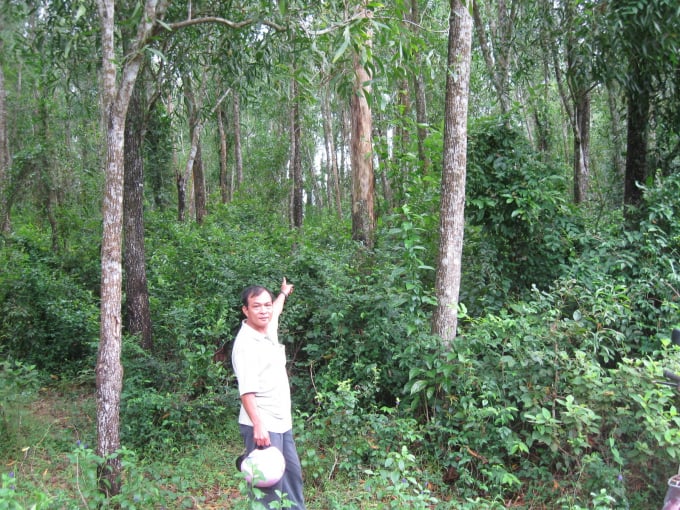
Large timber plantation households need capital support policies for long-term investment. Photo: V.D.T.
“Growing large acacia forests requires investment but we are also worried about forest fires and storms that will destroy trees. However, no unit sells plantation insurance.
Particularly, the Government have not paid nearly VND 4 billion to the company for natural forest protection in 2021. Currently, to protect natural forests, the company has to take its capital or borrow money to implement. In this situation, it is difficult for the company to maintain a large acacia wood forest because the longer the forest is kept, the more the company have to cover. It is necessary to have a policy to support us, so the movement of growing acacia wood will be stronger, " said Pham Ba Nghi, Director of Ha Thanh Forestry Co., Ltd.
Translated by Hien Anh

(VAN) Vietnam’s TH Group officially put its high-tech fresh milk processing plant into operation in the Russian Federation, marking a historic moment as the first TH true MILK cartons were produced in Russia.

(VAN) Use of high-quality broodstock and biotechnology is regarded as the most effective approach to ensuring sustainable and economically viable shrimp aquaculture ahead of climate change and the emergence of increasingly intricate disease patterns.

(VAN) Carbon farming is a form of agricultural practices that helps absorb more greenhouse gases than it emits, through smart management of soil, crops, and livestock.

(VAN) This is a key content of the Memorandum of Understanding recently signed between the Vietnam Fisheries Society and Kunihiro Inc of Japan.

(VAN) To achieve the goal, local authorities and businesses in Kon Tum province have fully prepared the necessary conditions for the new Ngoc Linh ginseng planting season.
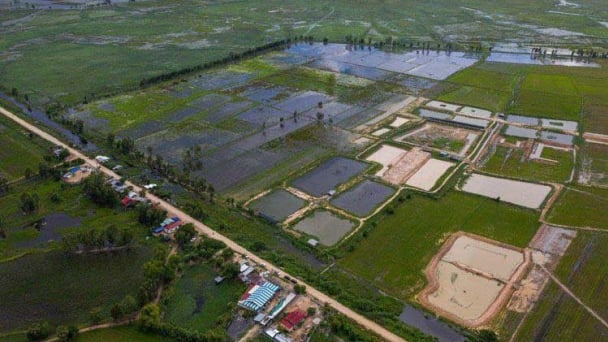
(VAN) Jiangsu province is gearing up to host training programs in Phnom Penh, the capital of Cambodia, this year to establish the Fish and Rice Corridor.
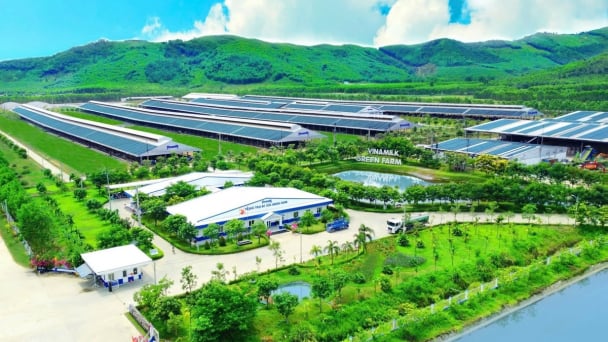
(VAN) Le Hoang Minh, representing Vinamilk, shared the company's experience in energy saving and green energy transition for production at a workshop held during the P4G Summit.